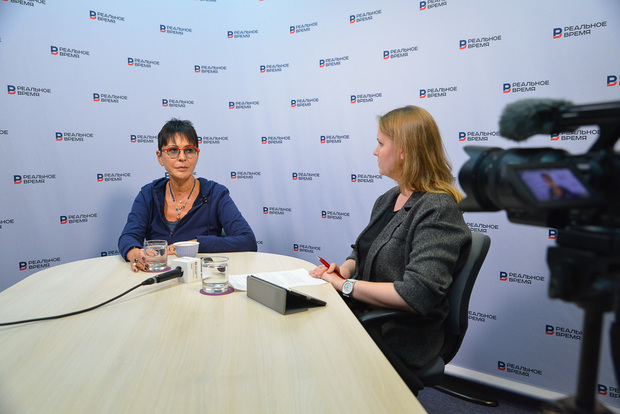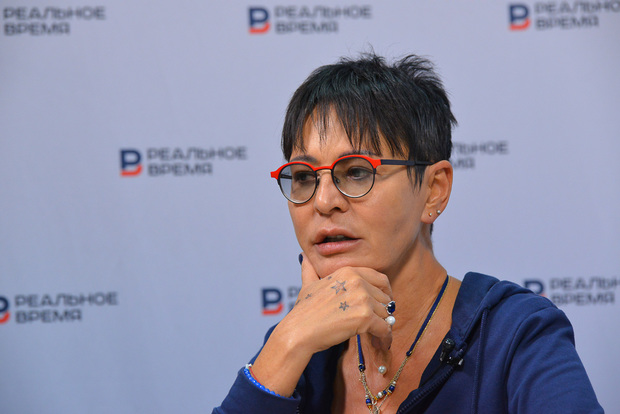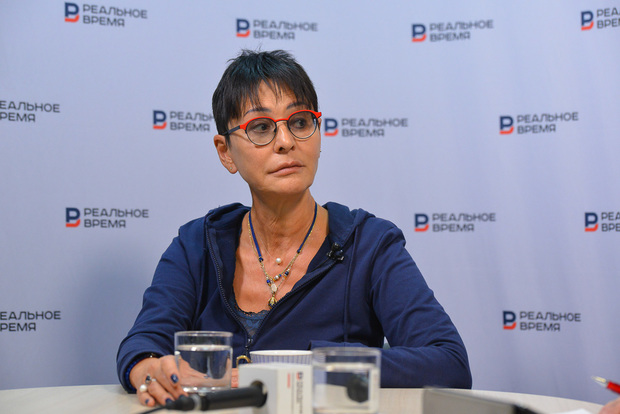Irina Khakamada: Regions suffer from the fact that the center takes all their money but returns with difficulty’
It is impossible to predict how the economy will develop while in Russia there are no clear rules for businesses, while the entrepreneurs do not assert their rights, while the state does not reduce the tax burden and doesn't stop pulling money from the regions. At the same time, it is needed the formation of a middle class, the base of which in Russia should become not the officials who are one of the most highly paid employees but the entrepreneurs and white-collar workers. This and many other questions were discussed during the online conference of Realnoe Vremya with the main female liberal Russian politician and public figure Irina Khakamada.
We should reduce taxes
Irina Khakamada came to the studio of Realnoe Vremya after the meeting with entrepreneurs of Kazan.
'There were about 300 people, approximately 70% were young people, 30% — respectable people, who head major companies. There were a lot of startuppers <...>. Most of all, of course, they worried about the distribution of money between the centre and the regions. Because the regions suffer from the fact that the center takes all their money but returns with difficulty,' began the conversation Irina Khakamada.
If for someone this question seemed to be more administrative, the speaker noted that the relationship between the business and the subjects of the Federation is direct. If taxes decrease, they need to look for money to compensate these 'losses'.
'In economics nothing happens separately. Everything is interconnected. Well, the second [the second thrilling question for the entrepreneurs — editor's note] is the lack of clear rules, under which there would be fewer inspections, fewer assaults and equal participation in competitions for obtaining various resources, including public procurement.'

After all, Tatarstan is a raw materials region! Oil! And it is right that the region does not stop only on the consumption of raw materials and the export of raw materials but also tries to create the economy of the future
In general, according to her, the businesspersons in Kazan asked the classic questions that can be heard in other regions. The differences must be sought in the positive moments.
'In Kazan the development of innovative platforms is taking place with the help of budget, both private and budget ones, there is a very intense stimulation of public investment in processing of raw materials. After all, Tatarstan is a raw materials region! Oil! And it is right that the region does not stop only on the consumption of raw materials and the export of raw materials but also tries to create the economy of the future. Because processing will always be in demand, even if oil prices fall,' says Khakamada.
Small and passive business
But here, in the development of the investment business, again the need to change tax policy raises here.
'It is wrong to push on a beginning company. I know that some companies have 400 inspections a year,' she was told about this, according to Khakamada, by Kazan businessmen in a private conversation. 'It is the redistribution of property. If something is successful they hunt you down with inspections.'
In general, says Khakamada, 'in Russia the system is powerful': 'And everything that is good, it is non-systemic, from bottom, therefore it comes and chokes.'
The way to fight the system alone — to be able to protect own interests, including through elections and voting: 'In the end, the menu is quite diverse.'

It's not mental. They just with flesh and blood accept these rules of the game. And fear settled that they will lose everything. And they don't understand that they will lose if they do not protect their interests
In general, the business structure in Russia Khakamada believes to be fragmented. At the federal level, the Institute of business ombudsman, Opora Rossii, Delovaya Rossiya and RSPP (Russian Union of Unducstrialists and Entrepreneurs) are trying to lobby the interests. But in the regions, the entrepreneurs are abandoned. Everything has been done so that the entrepreneurs 'lived by themselves and die most often by themselves'. The entrepreneurs do not have enough 'civil will' to protect their own interests: 'The business is very passive.'
'I am sick and tired of the same question: 'When will be better?' They will sit, they won't even go to the polls and let it be better. Let the others risk money, careers, but they will sit quietly, they will adapt and wait when it will be better — it is the position of the businesspersons. It's not mental. They just with flesh and blood accept these rules of the game. And they fear that they will lose everything. They don't understand that they will lose if they do not protect their interests,' believes Khakamada.
A Russian official as the basis of the middle class
Khakamada began to tell that private owners, including small businesses, are part of the middle class.
'The middle class generally consists of all highly paid employees in any field. In the West the middle class is composed of scientists, professors, school teachers, doctors, businessmen, managers. A smaller part is the officials.
'In Russia the officials turned out to be the richest. They make up 70% of our middle class. The teachers — fell out. The scientists — fell out. The doctors, almost all – fell out, except private doctors with their clinics. Only oligarchs and big businesses left.'
'The small businesses are also going bankrupt and falling out. We need to grow the middle class with the help of 'the wide layer of independent people.' Khakamada referred the white-collar workers (managers) and the owners of small companies. 'When they form a half of GNP, in Russia there will be economical, political and social stability,' believes the politician.

We need to grow the middle class with the help of 'the wide layer of independent people.' Khakamada referred the white-collar workers (managers) and the owners of small companies
The clear rules of the game are needed in order to stimulate the medium and small businesses, believes the politician. But we do not have them:
'We do not have such conditions; we do not have anything at the federal level. The progressive tax has been increased. The company tax. I have introduced the simplified tax system and single tax on imputed income. It was me! After me nothing has been done. They are going to increases taxes: tax on income. We made 13%. Now they want from 14% to 25%!' raising the voice said Khakamada.
Why e-commerce in Russia may 'collapse'
The next part of the conversation concerned the startups. According to Irina Khakamada, the most promising fields for the creation of new projects are agriculture and pharmaceuticals. The reason – the necessity to substitute the imported products. These fields are developing by the forces from above.
'If to take from the bottom, it is high IT-technologies and IT in the field of medical service. For example, in the field of the Internet medicine. The expenses are lower for such IT things. The brain is the main thing here. But we are threatened by the novelty: they want to introduce tax, goods and services tax on the Internet trade (tax on income). So everything may collapse.' Added Khakamada.
According to the guest of Realnoe Vremya, the startups are profitable for those who do not rent expensive real estate. The teams are working at home. They advertise and sell the equipment through the Internet. 'If to tax the Internet that we have in our real economy, then everything will collapse too. Then we will have nothing.' Added Khakamada.
That is why people are ready to take responsibility and head small businesses. We only should give them the rules of the game:
'People have nothing to eat. That is why they will undertake everything on themselves – they need the rules of the game. Exempt them from taxes. Do not tax the Internet, give them the opportunity to borrow at 4% — and people will go. Someone will go bankrupt but they will blame only themselves. But now they go bankrupt because they are taken away an opportinity, because we do not give it to them.'